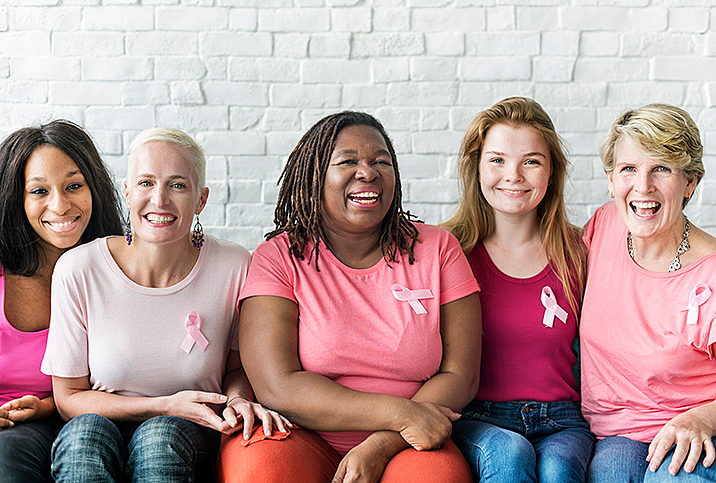Women With BRCA 'Partner Gene' Variant Have Elevated Cancer Risk

For decades physicians have counseled women with family histories of breast cancer to be tested for the BRCA gene mutation, which increases breast cancer risk by as much as 76 percent.
In 2014, advanced DNA testing methods revealed that variants in PALB2, a "partner and localizer" gene to BRCA2, carried an equal likelihood of increasing breast cancer risk.
A "dearth of guidelines" led the American College of Genetics and Genomics to publish its recommendations in 2021: Physicians should advise people with PALB2 mutations to take the same precautions and undergo the same surveillance as patients with the BRCA2 mutation.
"If you have a strong family history but have tested gene-negative in the past, you should have your doctor test you again," advised Lisa Richardson, MD, MPH, director of the Division of Cancer Prevention and Control in the National Center of Chronic Disease Prevention and Health Promotion at the Centers for Disease Control and Prevention (CDC).
Who is at risk and why?
"The BRCA can be normal but the PALB2 can be abnormal," Richardson explained, indicating women who have previously tested negative for the BRCA gene mutation can test positive for the PALB2 mutation. "This would have the same impact as the BRCA mutation, because PALB2 is not activating BRCA to do its job."
Richardson said anyone with a mother, sister, aunt or grandmother who has had breast or ovarian cancer, or a male relative with breast or pancreatic cancer, should get a doctor's referral for genetic screening. Women with Ashkenazi Jewish backgrounds should also be retested.
Nichole Morman, MS, certified genetic counselor and manager of OhioHealth Genetic Counseling, also stressed the importance of working with a healthcare provider to improve your odds.
"Genetic counseling is the first step," Morman said. "You can choose whether or not you want to proceed with genetic testing. If you do have a hereditary risk for cancer, you have many options available to help you be proactive, detect cancer early or to reduce the chances you'll get cancer."
Availability of resources varies
Susan Marinac, LISW, facilitates a breast cancer support group in Greater Cleveland for women under 40, the age group most likely to receive a cancer diagnosis if they have BRCA and PALB2 mutations. Because the city has both the world-renowned Cleveland Clinic and University Hospitals, the women in her group are very informed, she said.
"It's been fairly straightforward for them. They had a mom or aunt or grandmother who had cancer and they got the test and found out that they have the gene. Both of the main institutions here have done a pretty good job," Marinac said. "The majority have BRCA1 or 2 and have been tested and knew they were at higher risk than some women."
Proximity to major healthcare centers has allowed the women in her group the benefit of taking preventative measures.
Unfortunately, a 2017 report from the CDC revealed populations living outside of metropolitan areas have lower incidences of cancer but higher death rates. New scientific discoveries, such as PALB2, are less likely to reach them. Marinac says it's a problem of access.
'If you do have a hereditary risk for cancer, you have many options available to help you be proactive, detect cancer early or to reduce the chances you'll get cancer.'
"There definitely could be some missed steps if they are not connected to a major medical facility," she said. "I can see that as a major issue not only for the genetic stuff, but all the things that go in as far as treatments, access to clinical trials, things that you might not get out in the rural community."
To combat this challenge, some medical services like OhioHealth are increasingly using telemedicine to reach rural areas.
Another obstacle is cost, which could lead some women to use over-the-counter genetic testing kits that are not comprehensive, or forgo the process altogether. Morman says there are programs to help low-income women.
"At our center, people usually pay out of pocket between $50 and $250. Insurance usually covers some or all of the cost if medically indicated," she explained. "Individuals who are underinsured or uninsured can apply for financial assistance with the laboratory to decrease or eliminate the cost."
Knowledge is power
Morman understands that people with severe family histories might not want to see a bad future they may not be able to avoid. And once a test for BRCA says "safe," why would they want to get back in the water by testing for PALB2?
"Having a family history doesn't mean you will definitely get breast cancer," Morman explained. "The risk is variable depending on your genetic profile and family history. For some people, it may be 20 percent, for others it may be 80 percent."
"Either way we will work out a plan that's best for your level of risk," she continued. "For some women it may be having mammograms at 30 instead of 40, or adding breast MRI to your screening, or choosing to have a bilateral mastectomy. Genetic counseling and testing is the first step to help you understand your risk and make the right decision for you."


















